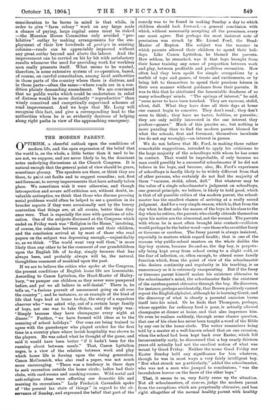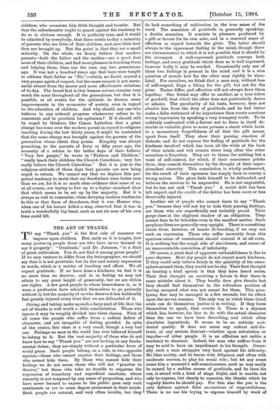THE MODERN PARENT.
OPTIMISM, a cheerful outlook upon the conditions of modern life, and the open expression of the belief that
the world is, on the whole, a little better than it used to be, are not, we suppose, and are never likely to be, the dominant notes underlying discussions at the Church Congress. It is natural enough that the general point of view should be grave, sometimes gloomy. The speakers are there, or think they are there, to point out faults and to suggest remedies ; not, first and foremost, to survey improvements that have actually taken place. We sometimes wish it were otherwise, and though introspection and severe self-criticism are, without doubt, in- valuable antiseptics, we think that those who discuss pressing social problems would often be helped to see a question in its broader aspects if they were occasionally met by the breezy contention that things are, at all events, better than they once were. That is especially the case with questions of edu- cation. One of the subjects discussed at the Congress which ended on Friday week was "Religion in the Home," involving, of course, the relations between parents and their children, and the conclusion arrived at by most of those who read papers on the subject was depressing enough,—unjustifiably so, as we think. "The world went very well then," is more likely than any other to be the comment of our grandchildren upon the English life of to-day, simply because that has always been, and probably always will be, the natural, thoughtless comment of mankind upon the past.
If we are to believe the critics who spoke at the Congress, the present conditions of English home life are lamentable. According to Canon Lyttelton, the Head-Master of Halley- bury, "we pamper our children as they never were pampered before, and yet we all believe in self-denial." There is, he tells us, "a furious pursuit of amusement going on all over the country " ; and he instances, as an example of the kind of life that boys lead at home to-day, the story of a sagacious observer who "was asked why, out of a certain large family of boys, not one was to take Orders, and the reply was : Simply because they have champagne every night at dinner.' " Further, "we have formed wild ideas as to the meaning of school holidays." Our sons are being trained to agree with the gamekeeper who played cricket for the first time in a country place where lavish hospitality VMS shown to the players. He was asked what he thought of the game, and said it would have been better "if it hadn't been for the running about between meals." That, Canon Lyttelton urges, is a view of the relation between work and play which home life is forcing upon the rising generation. Canon McCormick, who also read a paper, was not much more encouraging. "There was a tendency in these days to seek recreation outside the home circle; ladies had their clubs, with card-rooms and smoking-rooms. Wild social and anti-religious ideas were affecting our domestic life and marring its recreations." Lady Frederick Cavendish spoke of "the present lax state of things" in regard to the ob- servance of Sunday, and expressed the belief that part of the
remedy was to be found in making Sunday a day to which children should look forward,—a general conclusion with which, without necessarily accepting all the premieres, every one must agree. But perhaps the most insistent note of pessimism was struck by Mr. Lionel Ford, the Head- Master of Repton. His subject was the manner in which parents allowed their children to spend their holi- days. Like Canon Lyttelton, he blamed the parents. How seldom, he remarked, was it that boys brought from their home training any sense of proportion between work and play, between profitable and profitless recreation. How often had they been spoilt for simple occupations by a surfeit of toys and games, of treats and excitements, or by being left to themselves to spend their precious leisure in their own manner without guidance from their parents. It was to this that he attributed the lamentable deadness of so many schoolboys' minds. "The springs of interest," he said, "seem never to have been touched. They are vacuous, stolid, silent, dull. What they have done all their days at home one cannot begin to conceive. They don't read ; they don't seem to think ; they have no tastes, hobbies, or pursuits; they are only mildly interested in the one interest they profess—games." Much of this puzzles us ; but nothing is more puzzling than to find the modern parent blamed for what the schools, first and foremost, themselves inculcate (we do not say wrongly),—an interest in games.
We do not believe that Mr. Ford, in making these rather remarkable suggestions, intended to apply his criticisms to the large majority of the schoolboys with whom he has come in contact. That would be improbable, if only because no man could possibly be a successful schoolmaster if he did not believe in his boys, and because, also, Mr. Ford's experience of schoolboys is hardly likely to be widely different from that of other persons, who certainly do not find the majority of them "vacuous, stolid, silent, dull." But whatever may be the value of a single schoolmaster's judgment on schoolboys, one general principle, we believe, is likely to hold good, which is that of all possible critics of the modern parent, the school- master has the smallest chance of arriving at a really sound judgment. And for a very simple reason, which is, that from the day when he first asks the names of the boys in his class to the day when he retires, the parents who chiefly obtrude themselves upon his notice are the abnormal, not the normal. The parents with whom he is most often brought into contact—collision would perhaps be the better word—are those who are either fussy or tiresome or careless. The fussy parent is always insistent, especially in matters which regard health ; that is one of the reasons why public-school masters on the whole dislike the day-boy system, because So-and-so, the day boy, is perpetu- ally being kept away from school owing to a slight cold, or the fear of infection, or, often enough, to attend some family function which, from the point of view of the schoolmaster who desires continuity and regularity in his teaching, is as unnecessary as it is extremely exasperating. But if the fussy or tiresome parent himself makes his existence obtrusive to the schoolmaster's mind, the schoolmaster finds the existence of the careless parent obtrusive through the boy. He discovers, for instance, perhaps accidentally, that Brown positively cannot repeat the English alphabet, although he is learning Greek, and the discovery of what is clearly a parental omission burns itself into his mind. Or he finds that Thompson, perhaps, whose appetite for ordinary food is poor, is actually allowed champagne at dinner at home, and that also impresses him. Or even he realises suddenly, through some chance question, that one of his class has never been taught a word of the Bible by any one in the home circle. The writer remembers being told by a master at a well-known school that on one occasion, when the school had been kept back over Easter, which fell inconveniently early, he discovered that a boy nearly thirteen years old actually had not the smallest notion of what was meant by Good Friday. Neither the name Good Friday nor Easter Sunday held any significance for him whatever, though he was in most ways a very fairly intelligent boy. " But what struck me p articularly," added the schoolmaster, who was not a man who jumped to conclusions, "was the incredulous horror on the faces of the other boys."
That, it seems to us, very fairly sums up the situation. Not all schoolmasters, of course, judge the modern parent from the exceptions which are perpetually obtrusive, and lose sight altogether of the normal healthy parent with healthy
children, who occasions him little thought and trouble. But that the schoolmaster ought to guard against the tendency to do so is obvious enough. It is perfectly true, and it would be admitted by everybody, that there exists to-day a minority of parents who see little of their children, and care little how they are brought up. But the point is that they are a small minority. On the whole, we firmly' believe that modern parents—both the father and the mother—see a good deal more of their children, and find more pleasure in teaching them and helping them, than was the case, say, two generations ago. It was not a hundred years ago that boys were taught to address their father as "Sir,"—which, no doubt, argued a very proper spirit of respect, but the same respect is not neces- sarily absent from the nearer and more affectionate relations of to-day. The broad fact is that human nature remains very much the same throughout all the generations, but that it is possible, at all events for the optimist, to discern some improvements in the economics of society, even in regard to the education of children. And why should any one who believes in any ordered progress whatsoever refuse to be consistent and to proclaim his optimism P If it should still be urged by thinkers like Canon Lyttelton that a great change has come over the modern parent in regard to religious teaching during the last thirty years, it might be contended that the same charge was brought against the parents of the generation whose ideals they praise. Kingsley was always preaching, to the parents of forty or fifty years ago, the necessity of a return to the better days of their fathers. "Very few people," he wrote in "Fathers and Children," "really teach their children the Church Catechism; very few really believe the Church Catechism." But it is just to the religious attitude of those days that parents are now being urged to return. We cannot say that we deplore this per- petual tendency to insist that our forefathers were better men than we are, for it is so much clear evidence that some of us, at all events, are trying to live up to a higher standard than that which seems to be set up by the majority. But it is always as well to remember, when decrying modern tendencies to this or that form of decadence, that it was Homer who, when one of his heroes killed a stag, observed that it was in truth a wonderfully big beast, such as not six men of his own time could lift.











































 Previous page
Previous page